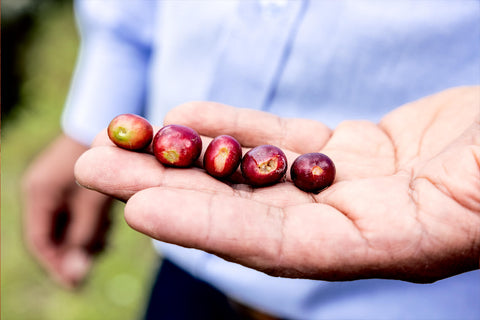Join us for a chat with Alejandro Cadena, the CEO of Caravela Coffee, and a proud partner of Standart Issue 25.
Can you tell us about some exciting new farms and regions you have recently added to your network? What kind of coffee can we expect from them?
In many of the producing countries where we have direct operations we have established, long-term relationships with coffee growing communities, settling over 40 purchasing stations in remote communities where the coffee is grown. In these purchasing stations, we’re always welcoming and receiving new faces, new producers that are interested in embarking in a different journey of specialty coffee and developing in their coffee businesses.
'The idea is to start working with these producers to develop their skills and improve the quality of their coffees.'
We are always happy to receive their samples and onboard them in the process of making their coffee better. Additionally, although is not our priority, we’re always open to exploring new potential regions, profiles and opportunities that come along.

Before starting an operation in a new municipality, we first receive samples from coffee growers that come from different regions to deliver their coffee to their nearest Caravela warehouse. We take our time to make the first approaches to the region, get to know the people and identify potential. This led us to recently opening our newest purchasing station in the municipality of Paicol in Huila. From this region, we’re seeing coffees that are sweet, with notes of chocolate, brown sugar, yellow fruits, and silky body.
Additionally, we’re in the process of starting a new operation in the municipality of Chaparral in Tolima, with a first approach through an educational project in partnership with a French association that works with young coffee growers in the Cañon de las Hermosas. In these younger generations we see a commitment to learn and embark in the journey of specialty coffee to be able to create a sustainable business for their future. The idea behind opening a new warehouse in Chaparral is also due to its proximity to several coffee producing municipalities and a central place which is easier for coffee producers to deliver and sell their product. Chaparral has a history of being a coffee hub in the department of Tolima with a potential for specialty coffee, we saw an interesting opportunity and have been studying it for some months and visiting potential coffee producers.
Lastly, we are in the exploration phase to start new relationships in the region of Risaralda in Colombia. This is a department where we have never had any relationships, however, we met some of these producers during a carbon credit project that we started a couple of years ago, and we saw the excitement, curiosity, and great potential in this group of producers.

Ecuador is another country where we are looking to grow and develop new relationships with farmers, both in continental Ecuador and in the Galapagos Archipelago. In continental Ecuador, we’re exploring regions like the province of Morona Santiago, Carchi, and Yangana. For example, in the province of Morona Santiago we have already started the approach with the coffee producers which are from indigenous communities, and we have started to receive samples to understand the profile and quality of their coffees. On the other hand, we have been working in the Galapagos for around 5 years but focused mainly on Isla Santa Cruz. Now, we’re exploring and developing relationships on the island of San Cristóbal. The qualities we expect to taste in these new regions range from 83 upwards. The idea is to start working with these producers to develop their skills and improve the quality of their coffees.
You won the 2022 Sustainability Award presented by the SCA for best business model. Tell us what does winning this award mean to the Caravela team. What are the pillars of that business model that make it award-winning?
For over 20 years, our business model has focused on contributing to the economic, social, and environmental sustainability for our people: coffee farmers, their communities, our employees, and our customers. Our business model is based on 5 basic pillars:
1. Purpose. Caravela’s purpose is to make coffee better for all. Making coffee better is not only in terms of quality, but that purpose also involves making an impact on all our stakeholders, including coffee farmers and their communities, our customers (coffee roasters) and their clients (coffee drinkers), our employees, society at large and our planet.
2. People. Coffee is not produced by trees or farms; coffee is grown and produced by people. Coffee is an extremely human product, made possible because behind every bean and every cup there are hard-working and passionate people.
To be closer to the people, we are present in the communities where we buy coffee from, establishing labs and warehouses and generating employment for children of coffee farmers. We employ them as quality analysts and educators, giving them the opportunity to grow personally and professionally with Caravela. We invest in these communities, through training and high paying jobs. We are committed to paying at least the living wage to 100% of our employees.

In the 7 producing countries where we operate, we have our PECA Program, (Educational Program for Coffee Growers) whose key role is to continuously educate producers and their families on best practices to increase productivity and improve quality so they can be more profitable. The team is composed by more than 40 educators, which work individually with farmers, providing access to agronomic education, sharing technical assistance on how to produce better and more sustainable coffee.
3. Product. Quality is the cornerstone to increase farmers’ incomes, which allows them and their communities to improve their quality of life. As coffee growers produce better coffee, we can pay higher prices to coffee farmers and properly reward them for their efforts because their quality stands out. Our pricing model rewards farmers with higher prices as quality increases, providing the economic incentives for them to continually improve their incomes if they want to.
4. Planet. We do all this, by placing, not only the people upfront, but also giving the planet the spot that it deserves, above profits. For the last five years, as we’ve seen coffee farms and communities progress and develop, we’ve focused much more on the environmental sustainability. We started our own organic supply chain, helping hundreds of coffee growers to receive their certification and being able to achieve better prices whilst taking care of the environment. In our day to day and in our decisions, we’re conscious about the planet and the footprint we leave on it, encouraging the monitoring, conservation, and responsible use of natural resources across the board, leading us to become the first Carbon Neutral green coffee trading company in 2021.
5. Performance. The model would not be sustainable if we had a short-term mindset. So, we aim to develop strong long-term relationships with coffee growers and roasters. This involves securing long-term contracts at fixed prices, which reduces farmer’s uncertainty and allows them to invest in their farms and their livelihood, while at the same time it reduces roaster’s price volatility, allowing them to plan and focus on delivering a competitive and consistent product for their clients.

We’re only one small fraction of the entire coffee industry and supply chain, we only work in seven of the more than 50 countries that produce coffee, we know that we aren’t the only ones aiming for a better coffee world, but we aim to make a greater call for those around us.
We are proud that Caravela has been recognized by other members of the industry as a proactive agent fostering sustainability. We are aware that sustainability is a step-by-step process with ever increasing challenges and growing opportunities, but this award is an assurance that our voice is being heard, that our actions are having the right impact upon our stakeholders and that we are in the right track to keep promoting the empowerment and development of Latin-American coffee growers and their families.
'For us, winning this award reiterates that our efforts are worth it and brings gratitude to all the people that have joined us in making coffee better.'
For us, winning this award is an opportunity to be role models and to spread and share that there is in fact a way of making coffee better. By winning this award, we pretend to raise our voices even higher and send an eye-opening message that for the coffee industry to thrive and prosper, we all need a change of mindset and understand that coffee is an extremely human product that also happens to depend on the planet’s health. For us, winning this award reiterates that our efforts are worth it and brings gratitude to all the people that have joined us in making coffee better.
What is the biggest sustainability challenge facing the industry right now, and what do you think the best way to mitigate this is?
The biggest sustainability challenge that the industry is currently facing is that despite the high market prices that we have seen in the last year, growing coffee continues to be the least sustainable business within the supply chain.

As an industry, there continues to be a gap between coffee growers and coffee consumers, and we continue thinking that coffee growers’ sustainability is assured by paying farmers a percentage above the market price. Price spikes don’t equal higher incomes for coffee farmers. Coffee growers continue to be affected by volatility, uncertainty, and increases in costs. As most businesses around the world, coffee growers are also seeing a significant increase in their costs of production. All inputs and labor costs, the two main factors that directly impact costs, are getting more expensive for them, offsetting much of the effect of increased market prices.
'Price spikes don’t equal higher incomes for coffee farmers.'
A sustainable coffee industry is where the spotlight and conversations are equally distributed among the people who produce the coffee and the people who roast it, prepare it and consume it. And this is not only about putting a face to the coffee and telling the story. It is also about empathy, and letting the coffee growers tell their own story, communicating the positives, but also sharing growing opportunities for everyone involved.
This interview was published in partnership with Caravela Coffee.



